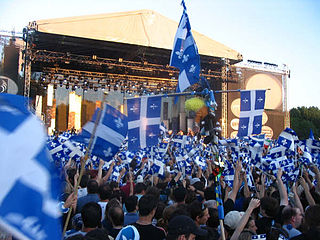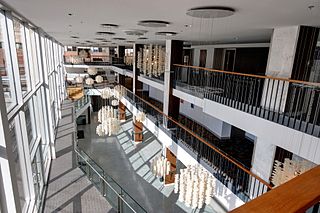| Part of a series on the |
| Cinema of Canada |
|---|
 |
| List of Canadian films |
This is a list of Canadian films which were released in 1970:
| Part of a series on the |
| Cinema of Canada |
|---|
 |
| List of Canadian films |
This is a list of Canadian films which were released in 1970:
The culture of Canada embodies the artistic, culinary, literary, humour, musical, political and social elements that are representative of Canadians. Throughout Canada's history, its culture has been influenced firstly by its indigenous cultures, and later by European culture and traditions, mostly by the British and French. Over time, elements of the cultures of Canada's immigrant populations have become incorporated to form a Canadian cultural mosaic. Certain segments of Canada's population have, to varying extents, also been influenced by American culture due to shared language, significant media penetration, and geographic proximity.

The Front de libération du Québec (FLQ) was a militant Quebec separatist group which aimed to establish an independent and socialist Quebec through violent means. It was considered a terrorist group by the Canadian government. Founded sometime in the early 1960s, the FLQ conducted a number of attacks between 1963 and 1970, which totaled over 160 violent incidents and killed eight people and injured many more. These attacks culminated with the Montreal Stock Exchange bombing in 1969 and the October Crisis in 1970, the latter beginning with the kidnapping of British Trade Commissioner James Cross. In the subsequent negotiations, Quebec Labour Minister Pierre Laporte was kidnapped and murdered by a cell of the FLQ. Public outcry and a federal crackdown subsequently ended the crisis and resulted in a drastic loss of support for the FLQ, with a small number of FLQ members being granted refuge in Cuba.

The October Crisis was a chain of political events in Canada that started in October 1970 when members of the Front de libération du Québec (FLQ) kidnapped the provincial Labour Minister Pierre Laporte and British diplomat James Cross from his Montreal residence. These events saw the Prime Minister Pierre Trudeau invoking the War Measures Act for the first time in Canadian history during peacetime.
The Quiet Revolution refers to a significant period of socio-political and socio-cultural transformation in French Canada, particularly in Quebec, following the election of 1960. This period was marked by the secularization of the government, the establishment of a state-administered welfare state known as the état-providence, a shift in political alignment toward federalist and sovereigntist factions, and the eventual election of a pro-sovereignty provincial government in the 1976 election. While the Quiet Revolution is often associated with the efforts of the Liberal Party of Quebec's government led by Jean Lesage and, to some extent, Robert Bourassa, its profound impact has influenced the policies of most provincial governments since the early 1960s.

Quebec nationalism or Québécois nationalism is a feeling and a political doctrine that prioritizes cultural belonging to, the defence of the interests of, and the recognition of the political legitimacy of the Québécois nation, particularly its French Canadian population. It has been a movement and a central issue in Quebec politics since the beginning of the 19th century. Québécois nationalism has seen several political, ideological and partisan variations and incarnations over the years.
Louise Lanctôt is a Canadian convicted kidnapper and writer. Born in Montreal, Quebec, Canada, Lanctôt is a political activist for the cause of Quebec independence from Canada. Louise Lanctôt was an active member of the Rassemblement pour l'indépendance nationale political party that later merged with the Parti Québécois. She was also a member of the Front de libération du Québec (FLQ) and is the sister of convicted kidnapper Jacques Lanctôt, and was married to Jacques Cossette-Trudel who joined the FLQ with her.
David Jay Bercuson is a Canadian labour, military, and political historian.

U Sports women's ice hockey is the highest level of play of women's ice hockey at the university level under the auspices of U Sports, Canada's governing body for university sports. Women's ice hockey has been played in U Sports since the 1997-98 season, when the governing body was known as the Canadian Interuniversity Athletics Union, following a long stint of teams only competing in the OUA. There are 35 teams, all of which are based in Canada, that are divided into four conferences that are eligible to compete for the year-end championship. As these players compete at the university level, they are obligated to follow the rule of standard eligibility of five years.

Imperial Oil Limited is a Canadian petroleum company. It is Canada's second-largest integrated oil company. It is majority-owned by American oil company ExxonMobil, with a 69.6% ownership stake in the company. It is a producer of crude oil, diluted bitumen, and natural gas. Imperial Oil is one of Canada's major petroleum refiners and petrochemical producers. It supplies Esso-brand service stations.

The lieutenant governor of Quebec (; is the representative in Quebec of the monarch, who operates distinctly within the province but is also shared equally with the ten other jurisdictions of Canada, as well as the other Commonwealth realms and any subdivisions thereof, and resides predominantly in his oldest realm, the United Kingdom. The lieutenant governor of Quebec is appointed in the same manner as the other provincial viceroys in Canada and is similarly tasked with carrying out most of the monarch's constitutional and ceremonial duties. The present and 30th lieutenant governor of Quebec is Manon Jeannotte, who has served in the role since January 25, 2024.

Thomas Eugene Flanagan is an American-born Canadian author, conservative political activist, and former political science professor at the University of Calgary. He also served as an advisor to Canadian prime minister Stephen Harper until 2004.
Fraser Barry Cooper is a Canadian political scientist at the University of Calgary. Before coming to Calgary, he taught at Bishop's University (1968–1970), McGill University, and York University (1970–1981). The winner of a Killam Research Fellowship, he is a fellow of the Royal Society of Canada. In 1991, Cooper wrote Action into Nature: An Essay on the Meaning of Technology and he co-authored Deconfederation: Canada without Quebec, in which he argued that Canada would benefit from Quebec separation. He is also the author of the 1999 publication Eric Voegelin and the Foundations of Modern Political Science.
The Plouffe Family is a 1981 Canadian drama film, based on Roger Lemelin's novel about the titular Plouffe family, set during World War II. The film was Canada's submission to the Academy Award for Best Foreign Language Film in 1981, but was not shortlisted as a nominee for the award.

Amazones d'Hier, Lesbiennes d'Aujourd'hui is the name of a quarterly French language magazine published starting 1982 by a lesbian collective in Montreal made of Louise Turcotte, Danielle Charest, Genette Bergeron and Ariane Brunet.
Bill Vazan is a Canadian artist, known for land art, sculpture, painting and photography. His work has been exhibited in North America and internationally.

Raymond Tait (Ray) Affleck was a Canadian architect. He was born on 20 November 1922 in Penticton, British Columbia. He died in Montreal on 16 March 1989. One of the founders of Montreal-based architectural firm Arcop, he also taught at leading universities in Canada and the United States.
Marcelle Deschênes-Harvey born in Price near Rimouski, Québec is a Canadian multi-media artist, music educator and composer of electroacoustic music. She was a professor at the University of Montreal.
Red, also known in some releases as Red the Half-Breed, is a 1970 Canadian drama film, directed by Gilles Carle. An exploration of anti-indigenous racism, the film stars Daniel Pilon as Reginald "Red" Mackenzie, the Métis half-brother of an otherwise all-white family of siblings, who becomes the primary suspect when his sister Elizabeth, the wife of wealthy car dealer Frédéric Barnabé, is murdered.